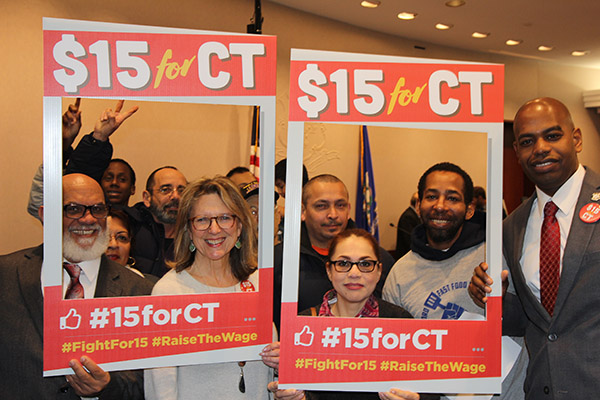Minimum Wage Advocates Join Sen. Kushner, Rep. Porter to Push for $15 Hourly Wage By 2022

HARTFORD – An economist, an employment lawyer, a labor leader, hourly employees and a religious leader joined Labor Committee Co-Chairs Senator Julie Kushner (D-Danbury) and Representative Robyn Porter (D- New Haven) today to make the case for a $15 hourly minimum wage in Connecticut, just one hour before proposed legislation to achieve that was debated at a legislative public hearing.
The group spoke at a press conference in advance of a Labor Committee public hearing on Senate Bill 2 and House Bills 5004 and 7191 (Governor Ned Lamont’s minimum wage bill.) Joining Sen. Kushner and Rep. Porter were EPI Senior Economist David Cooper, Leo Gertner of the National Employment Law Project, Bishop John Sellers, Connecticut AFL-CIO President Sal Luciano, hourly employees and other minimum wage advocates.
“It was five years ago this month that Connecticut passed a $10.10 hourly minimum wage to take effect by 2017. At the time, that was great, that was the highest in the nation. We were proud of that, of taking care of our private-sector workers,” Sen. Kushner said. “Now Connecticut badly lags behind our neighbors: Maine, Massachusetts, New York, Rhode Island and Vermont all have higher minimum wages than Connecticut. So it’s time to make a real change. We’re looking for a $2 increase by 2020, and another $1.50 in 2021 and another $1.50 in 2022. That’s $10,000 a year more in an employee’s pocket. At a time when Connecticut is ground zero for income inequality on planet Earth, raising the minimum wage to $15 an hour – and then indexing it for inflation after that – is long, long overdue.”
“This legislation is long overdue and will help bring much-needed revenue back into the state economy by putting more disposable income into the pockets of workers – money that goes back into our communities and produces more revenue for the state. In the end, all of Connecticut will benefit,” said Rep. Porter. “A higher minimum wage also will bring more dignity into the workplace. The cost of everything – rent, utilities, food, clothes – has risen and minimum-wage workers, some who are supporting families, are fighting and barely making ends meet. That’s just not right. If you put in an honest day’s work, you should be paid an honest wage. We need to give the workers in Connecticut what they deserve.”
The House and Senate bills seek to raise Connecticut’s hourly minimum wage from the current $10.10 per hour to $15 an hour in three steps: $12 an hour by January 1, 2020; $13.50 in 2021; and $15 in 2022, with future minimum wage increases after that automatically tied to any rise in the consumer price index for urban wage earners and clerical workers in the Northeast.
Gov. Lamont’s bill seeks a four-step process: $11.25 an hour by January 1, 2020; $12.50 in 2021; $13.75 in 2022; and $15 an hour by 2023, with future minimum wage increases after that automatically tied to any change in the employment cost index for wages and salaries for all civilian workers, as calculated by the U.S. Department of Labor.
The Labor Committee deadline for action on its bills is March 26.
Share this page:
